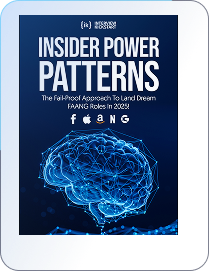Going through a comprehensive list of SQL interview questions for developers can help you outshine in the most challenging technical interview rounds at some major organizations, including Facebook, Microsoft, Amazon, Cognizant, Dell, Accenture, JP Morgan, and Stack Overflow.
Expert’s Quote:
“Designing a database schema is like composing a symphony. Each table, each relationship should play its part seamlessly to create a harmonious and efficient data symphony.â€
–Michael Stonebraker
(Database System Architect)
A career in SQL is quite lucrative, so the time you invest today to learn and prepare the crucial SQL topics would be well worth it. You must begin your preparation with basic SQL concepts and move on to the advanced SQL questions to crack interviews at FAANG+ companies. From strategizing about how to tackle SQL interview questions to understanding the vital concepts, here is all covered. Read on to kickstart your interview prep.
If you are preparing for a tech interview, check out our technical interview checklist, interview questions page, and salary negotiation e-book to get interview-ready!
Having trained over 11,000 software engineers, we know what it takes to crack the toughest tech interviews. Our alums consistently land offers from FAANG+ companies. The highest ever offer received by an IK alum is a whopping $1.267 Million!
At IK, you get the unique opportunity to learn from expert instructors who are hiring managers and tech leads at Google, Facebook, Apple, and other top Silicon Valley tech companies.
Want to nail your next tech interview? Sign up for our FREE Webinar.
Here’s what we’ll cover:
SQL is among the most desired skills in the market. There is an expanding dependence on data and information in top companies, and SQL skills guarantee promising career opportunities. A recruiter looks for the following skills in a SQL developer:

If you are preparing for a software engineer or data engineer job at Amazon or Facebook, go through the Amazon SQL interview questions and Facebook SQL interview questions to get interview-ready!
You must spend time planning carefully on what skills and interview answers will resonate with your interviewers most. The following SQL interview questions for developers will help you understand what questions you can anticipate in your upcoming interview.
You can find duplicate records using the following SQL functions:
Recommended reading: Top Advanced SQL Interview Questions and Answers.
Joins in SQL are of the following types:

Recommended Reading: Top SQL Joins Interview Questions and Answers you should practice.
A trigger in SQL is a type of stored procedure. It automatically runs as an event occurs in the database server. An SQL server has the following three types of triggers:

Read the 50+ SQL Interview Questions and tips on how to crack them.
The following table enumerates the key differences between static and dynamic SQL:
Oracle SQL Developer is a free access IDE (Integrated Development Environment) that allows you to work with SQL in Oracle databases. It is written in Java. This graphical tool enhances productivity while simplifying database development tasks. You can use Oracle SQL Developer for browsing database objects, running SQL statements, editing and debugging PL/SQL statements, and more.
T-SQL or Transact Structured Query Language is an extension of SQL functionality. Microsoft SQL Server and Sybase ASE support it. You should be prepared to answer SQL interview questions for developers on the differences between SQL and TSQL.
In SQL, you would use the LIMIT keyword, while in T SQL, you would use the TOP keyword to select the top ten rows.
Stored procedures in T SQL are collection statements stored within the database. They are prepared T SQL code that you can save and reuse repeatedly. They encapsulate oft-used queries, including conditional statements, loops, and other programming features.
Stored procedures hide direct T SQL queries from the code and improve the performance of database operations like deleting, selecting, and updating data. They are similar to functions in high-level programming languages.
The DECLARE statement allows you to define a local variable using TSQL. The name of the local variable begins with “@” as the first character. For example, integer CNT will be written as follows:
DECLARE @CNT INT
IDENT_CURRENT command returns the last identity value created for a specific view or table. The last identity value produced can be for any session and any scope.
IDENT_INCR command returns the increment value stated in forming an identity column in a table or view.
T SQL statements can be written and submitted to the Database engine as follows:
Does your job require T SQL skills? Check the top T SQL Interview Questions here.
You should be prepared well for SQL query interview questions. The interviewer can ask you to create SQL queries, or they can ask SQL query questions based on tabular data provided. The following SQL interview questions for developers will help you practice the most frequently asked questions.
Check more of these SQL Query Interview Questions for practice.
Practice some more PL/SQL interview questions for experienced professionals.
Take a look at some more SQL Server Interview Questions here.
The following tips will help you nail SQL interview questions and land your dream job.


Q1. How can I ace SQL interview questions for developers at FAANG companies?
With strategic preparation, you can ace the most challenging SQL interview questions for developers. You must begin by brushing up on the crucial SQL concepts, including DDL, DML, DCL, TCL keywords, SQL constraints, joins, indexes, and transactions.
Once you are clear on all the concepts, you must practice the most anticipated SQL interview questions for developers to assess your preparation. You must practice SQL query problems for coding interview rounds. You can also enroll for a few mock interviews to boost your confidence and get familiar with the standard interview process.
Q2. What are the five basic types of SQL commands?
The five basic types of SQL commands are Data Definition Language (DDL), Data Manipulation Language (DML), Data Control Language (DCL), Transaction Control Language (TCL), and Data Query Language (DQL).
Q3. What SQL concepts should I know for an entry-level SQL developer job interview?
If you are interviewing for entry-level SQL developer positions, you should be well-versed in the following concepts: SQL views, joins, keys, normalization of a database, transactions in SQL, subqueries, sequences, cloning tables, and temporary tables in SQL.
Q4. What are some advanced SQL concepts?
If you are applying for senior positions, you should be thorough with advanced SQL concepts: functions, hierarchical queries, stored procedures, triggers, indices, normal forms, primary and foreign keys, transactions, table constraints, CASE WHEN statements, and data time manipulation.
Q5. What is the average salary for a SQL developer in the US?
The average SQL Developer’s base salary is $1,02,887 per annum in the US and a $6,749 cash bonus per year (Source: Glassdoor). The salary varies from company to company, such as Facebook offers an average base salary of $178,000 per year, and Microsoft offers $104,438 per year.
Preparing for technical interviews, especially the challenging ones, steers you to become a better software professional with improved coding, problem-solving, and behavioral skills. You become more confident at taking and cracking interviews.
We’ve trained thousands of coding engineers, software developers, and data scientists to land dream offers at the biggest companies, including Google, Facebook, Amazon, Apple, Microsoft, and Netflix. Check out some reviews to learn more.
If you’ve put in the effort, you must know that you’ve gained an incredible experience in your professional life, irrespective of the results. So, make sure that you pat yourself on the back.
Sign up now to uplevel your career!
â€
Attend our free webinar to amp up your career and get the salary you deserve.

693+ FAANG insiders created a system so you don’t have to guess anymore!

100% Free — No credit card needed.

Time Zone:






Get your enrollment process started by registering for a Pre-enrollment Webinar with one of our Founders.

The 11 Neural “Power Patterns” For Solving Any FAANG Interview Problem 12.5X Faster Than 99.8% OF Applicants
The 2 “Magic Questions” That Reveal Whether You’re Good Enough To Receive A Lucrative Big Tech Offer
The “Instant Income Multiplier” That 2-3X’s Your Current Tech Salary

The 11 Neural “Power Patterns” For Solving Any FAANG Interview Problem 12.5X Faster Than 99.8% OF Applicants
The 2 “Magic Questions” That Reveal Whether You’re Good Enough To Receive A Lucrative Big Tech Offer
The “Instant Income Multiplier” That 2-3X’s Your Current Tech Salary
Just drop your name and email so we can send your Power Patterns PDF straight to your inbox. No Spam!
By sharing your contact details, you agree to our privacy policy.
Time Zone: Asia/Dhaka

We’ve sent the Power Patterns PDF to your inbox — it should arrive in the next 30 seconds.
📩 Can’t find it? Check your promotions or spam folder — and mark us as safe so you don’t miss future insights.
We’re hosting a private session where FAANG insiders walk through how they actually use these Power Patterns to crack interviews — and what sets top performers apart.
🎯 If you liked the PDF, you’ll love what we’re sharing next.
Time Zone:

